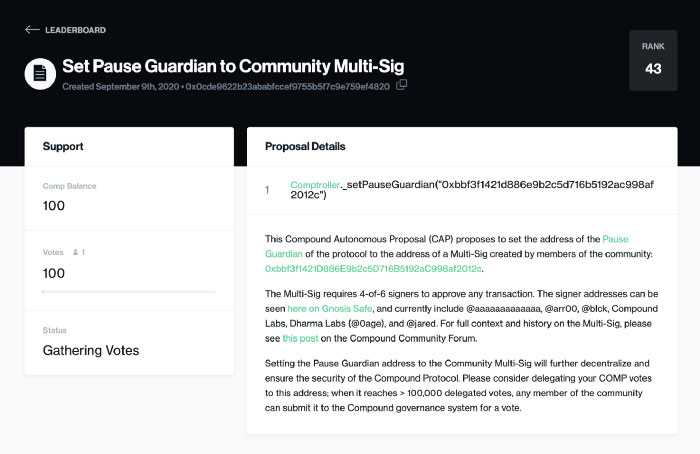Ethereum-based finance market protocol Compound announced today the introduction of Autonomous Proposals.
The new feature will build upon the existing governance model by decreasing the number of tokens required to send a governance-related proposal. Essentially, this will allow more users to voice their opinion on the project and design its course. Compound shared the news in a new blog post on their Medium.
Previously, the governance model required users to own 100,000 delegated COMP tokens on a specific address before being able to submit proposals. This has severely restricted the ‘democratic’ process of the governance model as not everyone could participate in major decisions.
Moreover, statistics have shown that users submitted only 22 proposals in the last few months. The data shows that there are not that many users participating in governance proposals. Additionally, only 18 of the 22 proposals have passed which shows that changing the protocol would be a slow process. To solve this critical problem, the Compound team released the Autonomous Proposals feature.
Autonomous Proposals – ‘Empowering the Community’
Officially called Compound Autonomous Proposals (CAPs), the feature enables smaller holders to participate in governance and deploy an autonomous proposal. Compound describes the new type of proposal as a smart contract containing parameters seen in a normal governance proposal, such as title, description, and governance actions. Users only need to hold 100 COMP to deploy the proposal.
The team evolved the feature further by introducing the aspect of ‘public support.’ Users can vote for autonomous proposals on Compound’s main website and delegate their votes to the ETH address of the proposal. Once the proposal reaches a threshold of the traditional 100,000 delegated votes, any COMP user can call a public launchProposal function.
The function will create the normal formal governance proposal after which the traditional voting process starts. The COMP community can then vote on the autonomous proposal and submit their ‘for’ delegated votes.
Another function of the proposal is the ability to terminate it. The submitter locks his COMP tokens into the contract and can at any time call a function that will return his tokens and delete the proposal.
First Autonomous Proposal created by the Compound Team
The Compound team decided to be the first one to test and deploy an autonomous proposal. The community can already vote for the proposal at the time of writing. The team states that the contract was fully tested and then deployed on the mainnet. Called ‘Set Pause Guardian To Community Multi-Sig, the team proposes to set the ‘Pause Guardian address’ of the project’s protocol to a 4 of 6 multi-sig created by the community.
Explained in plain terms, the Pause Guardian is an address that can disable certain protocol functions. Users can utilize the feature in events where a major vulnerability appears. Its only function at the current moment is to disable certain functions. These include, mint, borrow, transfer, and liquidate. Furthermore, the Pause Guardian is unable to unpause a decision. The address of the feature is chosen by the Compound community.


![Compound [COMP] Improves Governance Protocol by Introducing Autonomous Proposals](https://crypto-economy.com//wp-content/uploads/2020/09/COMPOUND-PROPOSALS-1024x576.jpg)









